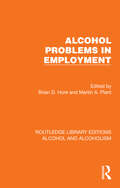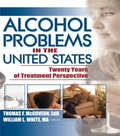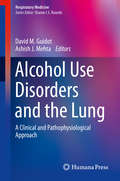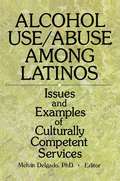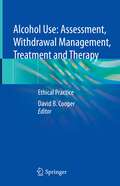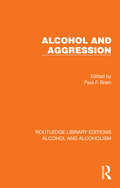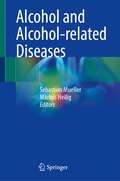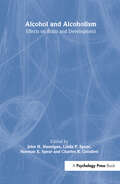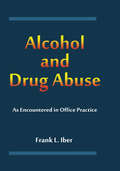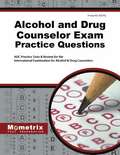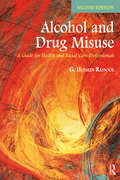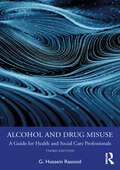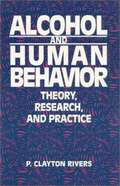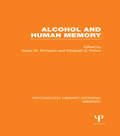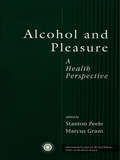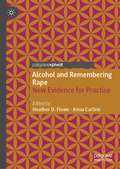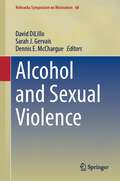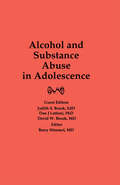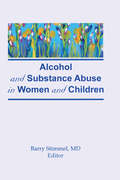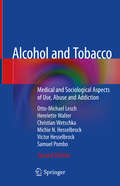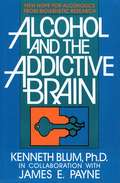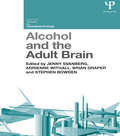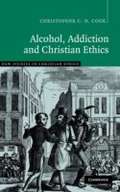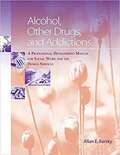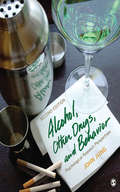- Table View
- List View
Alcohol Problems in Employment (Routledge Library Editions: Alcohol and Alcoholism)
by Brian D. Hore Martin A. PlantThe majority of problem-drinkers are not unemployed derelicts but are employed persons often with senior positions in commerce, the professions and industry. Furthermore, it is well-known that alcohol causes widespread absenteeism, inefficiency and accidents at work. Originally published in 1981, Alcohol Problems in Employment reviews the evidence relating to the general effects of alcohol misuse on employment and the special problems involved in certain ‘high-risk’ industries at the time. A number of international case studies are then presented to illustrate what was being done to counter the problem.
Alcohol Problems in the United States: Twenty Years of Treatment Perspective
by William White Thomas F McgovernAlcohol Problems in the United States: Twenty Years of Treatment Perspective presents an overview of trends in the treatment of alcohol problems over a 20-year period from three vantage points: broader treatment perspectives, experienced views from the field, and personal perspectives. Some of the field's foremost experts, including Alcoholics Anonymous historian Dr. Ernest Kurtz and Dr. Robert Sparks, who chaired the committee that authored the Institute of Medicine&’s highly influential study, "Broadening the Base of Treatment for Alcohol Problems," provide practical information on the vital treatment issues you deal with every day. By detailing treatment histories of the recent past, contributors offer a look at likely future trends that will help keep your treatment methods up to date. Treatment topics addressed in Alcohol Problems in the United States: Twenty Years of Treatment Perspective include: alcoholism as a disease alcohol dependence and mental illness the role of spirituality the growth and decline of treatment programs at the Mayo Clinic and Timberlawn Hospital and the special treatment needs of women, youths, African Americans, Native Americans, the Latino community, and the incarcerated. Alcohol Problems in the United States: Twenty Years of Treatment Perspective chronicles the story of alcohol treatment from historical and personal perspectives, offering the opportunity to anticipate future trends in the many challenges associated with alcohol problems. The book is an essential resource for professional alcoholism counselors, social workers, psychologists, physicians, clergy, nurses, employee assistance professionals, and anyone who provides care and service to those struggling with alcohol.
Alcohol Use Disorders and the Lung: A Clinical and Pathophysiological Approach (Respiratory Medicine #14)
by David M. Guidot Ashish J. MehtaAlcohol Use Disorders and the Lung: A Clinical and Pathophysiological Approach is an excellent resource for clinicians who care for individuals affected by alcohol use disorders in diverse settings. Although alcohol abuse alone does not cause acute lung injury, it renders the lung susceptible to dysfunction in response to the inflammatory stresses of sepsis, trauma, and other clinical conditions recognized to cause acute lung injury. In parallel, these same pathophysiological effects of alcohol abuse significantly increase the risk of a wide range of serious lung infections. Many clinicians involved in the primary treatment of alcohol use disorders, such as addiction psychiatrists, will find this text of interest as it will expand their understanding of the health consequences of alcohol use disorders. In parallel, clinicians who specialize in pulmonary and/or critical care medicine will have a unique resource that provides a comprehensive review of the pathophysiology of alcohol-related lung disorders and insights into evolving therapeutic options in these vulnerable individuals. Alcohol Use Disorders and the Lung: A Clinical and Pathophysiological Approach fills a gap in the literature and presents the evolving clinical research that may soon lead to novel therapies that can improve lung health in individuals with alcohol use disorders and co-existing conditions such as HIV infection.
Alcohol Use/Abuse Among Latinos: Issues and Examples of Culturally Competent Services
by Melvin DelgadoIn Alcohol Use/Abuse Among Latinos: Issues and Examples of Culturally Competent Services, you will learn how to design and improve services for Latinos with substance abuse problems by understanding that the cultures and personal backgrounds of your clients are crucial to the counseling process. This text will also show you how these service skills apply to the individual, family, or an entire community. Studies show that, according to patients, culturally sensitive and responsive practitioners are generally more credible, trusted, and effective. Alcohol Use/Abuse Among Latinos takes into account several different aspects that will help you develop these traits and provide successful services for Latinos dealing with alcohol or other drug problems. You&’ll gain valuable insight into:the five elements that are vital to a successful ATOD (Alcohol, tobacco and Other Drug) service--multiculturism, resilience/strengths, competence, community capacity development, and community participation--plus a detailed explanation of why they are needed step-by-step instructions for using three methods, supervision, inservice training, and consultation, as means of providing ongoing learning of cross-cultural competencies to practitioners why key factors such as economic background, gender, and sexual orientation need to be taken into consideration for ATOD services to be effective demographic patterns and case studies of Latino users and abusers of alcohol and other drugs that illustrate the growing number of Latinos in need of ATOD services why the practitioner needs to be aware of how family importance, values attached to cooperation versus competition, sociability, respect, and action-oriented problem-solving play a role in effective services for Latinos the need for practitioners to understand how ethnic identity, biculturality, Spanish language fluency, gender-specific role expectations, skin color, and overall sense of self can affect the success of services for Latino teenagers how excessive marketing of alcohol to Latino communities, lack of representation, and a lack of community involvement are key barriers to successful ATOD services for LatinosAlcohol Use/Abuse Among Latinos also discusses Latino mens’and womens’individual needs concerning substance abuse. One of the topics addressed, the loss of self-esteem, has been found to be a contributing factor to alcohol use and abuse for Latinas. It offers ways you can promote self-esteem in your Latina clients by focusing on their cultural heritage and pride. In addition, this text takes a unique look Latina lesbians and how training through educational and agency internship programs can promote awareness to your clients&’ special needs concerning substance abuse. Alcohol Use/Abuse Among Latinos will help you provide all of your Latino clients with efficient and culture-friendly services for resisting or overcoming the abuse of alcohol, tobacco, or other drugs.
Alcohol Use: Ethical Practice
by David B. CooperThe book brings together the most up-to-date knowledge and expertise covering the whole topic of alcohol. It presents the practical skills needed to offer ethical intervention and treatment and implement ethical person-centered care. It is a practice-based text that aims to improve ethical relationships, responses, care and practice necessary to be effective in interventions and treatment with those experiencing alcohol use and health problems. The focus is on combining the principles and philosophy of alcohol prevention and intervention, in hospital and community. Each chapter provides self-assessment exercises, reflective practice exercises, key points and a "to learn more" section, and develops a theoretical framework, before broadening to include application in care and practice. This work will appeal to a wide readership, from professionals working within the mental health care and practice environment to mental health students.
Alcohol and Aggression (Routledge Library Editions: Alcohol and Alcoholism)
by Paul F. BrainIn the 1980s the relationship between alcohol and aggression and violence was a controversial one. Much of previous thinking had been based on anecdotal evidence. In contrast this book, originally published in 1986, is based upon recent scientific evidence from a broad range of studies from animal experimentation to clinical and social research. The initial chapters describe what aggression is, in terms of theories of animal behaviour, how alcohol influences neural and endocrine functions and behaviour and how problematic it often is to extrapolate from animal research to humans. Later chapters give critical reviews of attempts to relate alcohol intake to violence and crime. The book represents a major synthesis of work from many disciplines and will interest workers in animal behaviour, alcohol studies, psychopharmacology and social psychology.
Alcohol and Alcohol-related Diseases
by Markus Heilig Sebastian MuellerAlcohol is one of the major risk factors for negative health outcomes worldwide. It accounts for more than 60 alcohol-related diseases, ranging from addiction, through liver cirrhosis, to cancer. Collectively, these conditions account for mortality and morbidity that make alcohol use one of the leading preventable causes of disability adjusted life-years (DALYs) lost globally. In this book, an international faculty covers all aspects of alcohol-related disorders, ranging from addiction/alcohol use disorders (AUD) to alcohol-related diseases of other organs such as liver, heart or cancer. A special focus is to reach out to primary care physicians who are in the front line of this major health problem. The book also provides an update for addiction specialists, as well as specialists in internal medicine, gastroenterology and hepatology. The book is divided into sections that include epidemiology, alcohol use disorders and addiction, alcohol-related liver disease, alcoholic hepatitis, primary care and interdisciplinary approaches and other alcohol-related diseases. Besides current diagnostic measures and treatment strategies, the book deals with the many underlying molecular and genetic mechanisms of alcohol toxicity. Novel insights include prospective data on all-cause mortality and the emerging major role of alcohol-mediated hemolysis and enhanced red blood cell turnover. The book also aims at guiding policy makers to handle the topic of alcohol in our society more responsibly.
Alcohol and Alcoholism: Effects on Brain and Development
by Norman E. Spear John H. Hannigan Linda P. Spear Charles R. GoodlettThis is the first volume that focuses on the lifespan neurobehavioral factors likely to determine susceptibility to alcohol abuse and its consequences. The chapters offer careful analysis of the effects of ethanol on the fetus, the infant, the adolescent, and the adult. The authors include behavioral neuroscientists and clinical neuropsychologists. Their topics range from the neurochemical and neuroanatomical consequences of prenatal alcohol to the cognitive consequences of prenatal alcohol on preschool and school-age children. The impact of genetics on sensitivity to alcohol is considered in terms of analytic tests using techniques of behavioral genetics and molecular biology. The consequences of exposure to alcohol during breastfeeding are described in experiments with human infants. The alcoholism that develops in adulthood is analyzed through the experimental study of relapse from alcohol deprivation and assessment of neuropsychological impairments and treatment for alcoholics. Drawing on extensive research that has applied techniques from molecular neurobiology and tests of learning and memory to the clinical assessment and treatment of alcoholics. The volume answers recent questions raised by the National Institute of Alcohol Abuse and Alcoholism and the National Institute of Drug Abuse about the role of early experience in susceptibility to later abuse of alcohol and other drugs. Although epidemiological studies can describe the problem, solutions in terms of mechanisms that mediate these effects will be found only with the kinds of experimentally oriented approaches the chapter authors describe.
Alcohol and Drug Abuse as Encountered in Office Practice
by Frank L. IberThis book has been written to serve as a manual for physicians practicing in a private office setting to recognize and recommend appropriate treatment for patients believed to be substance abusers. While it is not written for drug abuse specialists, it provides information regarding the diagnosis and treatments a competent, concerned physician can provide without becoming immersed in addiction treatment. Topics discussed include the degree to which a physician should become involved, when it is appropriate to refer, using other professions and volunteer groups, and useful medications. Guidelines for recognizing substance abuse, testing to confirm the abuse, confronting the patient, and motivating the patient into specific treatment are also presented. Tables and illustrations are used to summarize major points, making this an extremely useful reference tool for internists and other non-specialist private practitioners.
Alcohol and Drug Counselor Exam Practice Questions: ADC Practice Tests and Review of the International Examination for Alcohol and Drug Counselors
by ADC Exam Secrets Test Prep Staff<p>Alcohol and Drug Counselor Exam Practice Questions are the simplest way to prepare for the Alcohol and Drug Counselor test. Practice is an essential part of preparing for a test and improving a test taker's chance of success. The best way to practice taking a test is by going through lots of Alcohol and Drug Counselor practice questions. <p>Our Alcohol and Drug Counselor Exam Practice Questions give you the opportunity to test your knowledge on a set of questions. You could know everything that is going to be covered on the test but still perform poorly if you have not had a chance to practice. Repetition is a key to success and using Alcohol and Drug Counselor practice test questions allows you to reinforce your strengths and improve your weaknesses. <p>Detailed answer explanations are also included for each question. It may sound obvious, but you have to know which questions you missed (and more importantly why you missed them) to be able to avoid making the same mistakes again when you take the real test. That's why our Alcohol and Drug Counselor Exam Practice Questions include answer keys with detailed answer explanations. These in-depth answer explanations will allow you to better understand any Alcohol and Drug Counselor questions that were difficult for you or that you needed more help to understand.</p>
Alcohol and Drug Misuse: A Guide for Health and Social Care Professionals
by G. Hussein RassoolWritten by an experienced academic author, lecturer and practitioner, this comprehensive textbook provides an introduction to alcohol and drug misuse. It presents: the context of alcohol and drug misuse, and the nature and theories of addiction, including a historical overview and policy initiatives in contemporary society an overview of the problems associated with psychoactive substances and their impact on groups such as culturally and linguistically diverse communities, young people, women, older people and the homeless an understanding of the generic role responses to substance misuse in a variety of different settings and contexts, including primary care, the community and hospitals a framework for assessment, care planning, harm reduction approaches, dealing with overdose, intoxication and withdrawals, and psychological and pharmacological interventions an accessible and skills-oriented approach to assist students and practitioners in dealing with alcohol and drug misuse. This new edition is fully updated and includes new material on: evidence-based pharmacological interventions; recent global strategies in alcohol and drug; dual diagnosis and women; shisha smoking; and current statistics on prevalence of alcohol and drug misuse Alcohol and Drug Misuse takes into account current policy and practice for substance use and misuse and includes a range of pedagogical features to enhance learning. It is essential reading for nursing, health and social work students taking substance misuse modules, as well as related CPD courses for health and social care professionals.
Alcohol and Drug Misuse: A Guide for Health and Social Care Professionals
by G. Hussein RassoolThis comprehensive textbook provides an accessible and skills-oriented introduction to alcohol and substance misuse for healthcare students and practitioners new to the field.Divided into five parts, this text explores: The context of alcohol and drug misuse and the nature and theories of addiction, including a historical overview and policy initiatives in contemporary society. An overview of psychoactive substances and the problems associated with them. An exploration of the impact of psychoactive substances on groups, such as culturally and linguistically diverse communities, young people, women, older people, and the homeless. An understanding of the generic role responses to substance misuse in a variety of different settings and contexts, including primary care, the community, and hospitals. A framework for assessment, care planning, harm reduction approaches, dealing with overdose, intoxication and withdrawals, and psychological and pharmacological interventions. This new edition is fully updated and includes expanded coverage of performance-enhancing drugs, e-cigarettes, cannabis use, gender disparities in substance use and treatment, public health approaches to substance use, and screening tools for alcohol misuse. Alcohol and Drug Misuse is enhanced with activities and learning outcomes throughout.It is essential reading for nursing, healthcare, and social work students taking substance misuse modules, as well as related post-registration/qualification courses for health and social care professionals.
Alcohol and Human Behavior: Theory, Research, and Practice
by P. Clayton RiversSurveys the critical issues discussed in the field, pointing out how each issue has been approached from several theoretical perspectives.
Alcohol and Human Memory (Psychology Library Editions: Memory)
by Elizabeth Parker Isabel BirnbaumOriginally published in 1977, the chapters in this volume offer a concise review of the research and new direction in the study of alcohol and cognition at the time. Each chapter has been prepared by an eminent researcher who was currently involved in investigating human cognitive behaviour. The chapters contain not just a dry summary of work done in the field, but descriptions of the impetus for the work that was done, problems in doing such work, knowledge that was gained, and suggestions for future research. Many new approaches are presented for the study of alcohol and memory, and for the understanding of results of studies already done. This was a forward-looking volume not only about directions for future research, but with solid contributions that review and integrate major areas of inquiry on the influence of alcohol on memory and behaviour at the time.
Alcohol and Pleasure: A Health Perspective (ICAP Series on Alcohol in Society)
by Stanton Peele Marcus GrantThere is no simple threshold between the experience of drinking and the pleasure it can bring on the one hand and the pain and suffering caused by alcohol abuse on the other. But if we are to understand the role of alcohol in society, then at the very least we need to acknowledge the pleasure as well as the pain. Alcohol and Pleasure aims to bring together existing knowledge on the role of pleasure in drinking and determine whether the concept is useful for scientific understanding and policy consideration.
Alcohol and Remembering Rape: New Evidence for Practice
by Anna Carline Heather D. FloweThis book examines how alcohol intoxication impacts upon the memory of rape victims and provides recommendations for how best to investigate and prosecute such rape complaints. An estimated 75% of victims are under the influence of alcohol during a sexual assault and yet there is surprisingly little guidance on conducting interviews with complainants who were alcohol-intoxicated during the attack. This book will provide a distinctive, rigorous and important contribution to knowledge by reviewing the evidence base on the effects of alcohol on memory performance. The book brings together a range of academics from various disciplines, including psychology, law and criminology, and it discusses the implications for practice based on consultation with various criminal justice practitioners, including police officers, barristers who defend and prosecute rape cases and policy makers.
Alcohol and Sexual Violence (Nebraska Symposium on Motivation #68)
by Sarah J. Gervais Dennis E. McChargue David DiLilloThis book provides a chronology of the 68th Nebraska Symposium on Motivation, which is focused on contemporary research knowledge about sexual violence and alcohol use. This book is more specific to dating and intimate partner sexual violence in young adult populations. The target audience is researchers, prevention agencies and policymakers within academia and military settings. Alcohol use has long been recognized as a major contributor to sexual assault, with an estimated 50% of sexual assaults in the U.S. involving drinking by the victim, perpetrator, or both. Beyond the usual harmful effects, alcohol-involved assaults are associated with unique sequelae for female victims, including increased self-blame, stigma, and greater alcohol use to cope. Moreover, heavier drinking on the part of the perpetrator is associated with more serious incidents of assault (e.g., involving physical force) that result in more severe outcomes for victims. The purpose of this Symposium on Motivation is to bring together a group of experts in the areas of alcohol and sexual aggression to articulate the causes, consequences, and mechanisms of alcohol-involved sexual assault. Speakers will talk about classic and contemporary research and theories on these issues using cutting-edge approaches (e.g., virtual reality, neuroscience, laboratory-based alcohol administration) from a variety of perspectives (perpetrators, victims, bystanders).
Alcohol and Substance Abuse in Adolescence
by Barry Stimmel Judith BrookThis timely volume explores the possible reasons that young people turn to drugs, the most effective methods to manage those who are afflicted, and ways to educate youth to prevent their initial drug involvement.
Alcohol and Substance Abuse in Women and Children
by Barry StimmelHere is a timely volume that examines the problems of substance abuse in women and children, with a particular emphasis on the role played by the family in the development and perpetuation of the problem.
Alcohol and Tobacco: Medical and Sociological Aspects of Use, Abuse and Addiction
by Henriette Walter Otto-Michael Lesch Christian Wetschka Michie N. Hesselbrock Victor Hesselbrock Samuel PomboThis updated and revised second edition of “Alcohol and Tobacco” reflects the new ICD 11 and DSM V classifications and provides comprehensive descriptions of new therapeutic approaches, outlining the different interactions between personality, environment and the effects of the respective substance. In addition to new data on prevention-based therapies, especially for smoking addiction, the book also presents essential psychological and sociological strategies, and medication-based therapies. Particular attention is given to new medications and new compounds for e-cigarettes, while a broad overview of the American and European epidemiology of alcohol and nicotine addictions rounds out the coverage. Given the breadth and depth of its coverage, the book will appeal to a wide readership, from professionals to researchers and students.
Alcohol and the Addictive Brain: New Hope for Alcoholics From Biogenetic Research
by Kenneth BlumA new understanding of the nature and progression of alcohol addiction is emerging: alcoholism as the result of an imbalance in the brain's natural production of neurotransmitters critical to our sense of well-being. This imbalance, which an increasing amount of evidence is demonstrating to be genetically influenced, produces a craving temporarily satisfied by drinking. "Alcohol and the Addictive Brain" is an account of the recent scientific discoveries concerning alcoholism.
Alcohol and the Adult Brain (Current Issues in Neuropsychology)
by Brian Draper Jenny Svanberg Adrienne Withall Stephen BowdenThe research literature on the impact of alcohol on the brain has seen a rapid expansion in recent years. Alcohol and the Adult Brain presents an up-to-date overview of some of the issues relevant to understanding and working with people with cognitive impairment as a result of chronic alcohol use. One issue causing barriers to effective treatment and care is the stigma associated with alcohol dependence, resulting in the belief that difficulties associated with alcohol related brain damage (ARBD) are ‘self-inflicted’. Cognitive changes resulting from alcohol excess and poor nutrition can directly affect an individual’s ability to motivate themselves, make decisions, and make the informed choices that underlie behaviour change. Attitudes held by professionals, reinforced by societal norms, that a person is ‘choosing to drink’ and ‘not motivated to engage with treatment’, in combination with the often subtle cognitive deficits associated with ARBD, can result in a lack of timely intervention, with enormous personal, social and economic cost. The chapters in this book set ARBD in a social and cultural context, provide discussion of the difficulties in definition and diagnosis, and outline the structural brain changes and neuropsychological deficits associated with chronic alcohol use. The book provides an overview of recent research on ARBD, including impairments associated with Wernicke-Korsakoff Syndrome, and discusses up to date recommendations for managing and working with this complex and varied disorder. Alcohol and the Adult Brain will be essential for students and researchers working with ARBD and for practitioners in a range of health, social care and voluntary settings.
Alcohol, Addiction and Christian Ethics
by Stanley M. Hauerwas Christopher C. H. Cook Robin Gill Stephen R. L. Clark Robin W. LovinAddictive disorders are characterised by a division of the will, in which the addict is attracted both by a desire to continue the addictive behaviour and also by a desire to stop it. Academic perspectives on this predicament usually come from clinical and scientific standpoints, with the 'moral model' rejected as outmoded. But Christian theology has a long history of thinking and writing on such problems and offers insights which are helpful to scientific and ethical reflection upon the nature of addiction. Chris Cook reviews Christian theological and ethical reflection upon the problems of alcohol use and misuse, from biblical times until the present day. Drawing particularly upon the writings of St Paul the Apostle and Augustine of Hippo, a critical theological model of addiction is developed. Alcohol dependence is also viewed in the broader ethical perspective of the use and misuse of alcohol within communities.
Alcohol, Other Drugs and Addictions: A Professional Development Manual for Social Work and the Human Services
by Allan Edward BarskyTo help prepare you for the realities of working with clients affected by addictions, this beneficial text provides you with the necessary tools needed to competently translate addictions theory into practice. It offers a thorough examination of a range of models and perspectives for helping, and it encourages critical thinking to best match approaches with clients and situations. Presented in a work-text format, this book is full of cases, exercises, role-plays, and questions to increase your understanding of concepts and application to practice.
Alcohol, Other Drugs, and Behavior: Psychological Research Perspectives
by John R. JungProviding a psychological perspective on the use and abuse of alcohol and other psychoactive drugs, this Second Edition includes more coverage of the theories of alcohol and other drug use and abuse, as well as broad conceptual issues related to the nature of addiction and recent developments in research methods.Key FeaturesFocuses on alcohol, which is used more widely than any other drug, and the one that is associated with the most societal harmEvaluates important studies on major issues, concepts, and theories rather than providing exhaustive literature reviewsTeaches students to become educated consumers of research findings, rather than passive or uncritical recipientsAncillariesA Student Study Site with chapter summaries, multiple-choice quizzes, flashcards for glossary items, an annotated list of relevant Web sites, informational QuickTime movies, and SAGE journal articles.A password protected Instructor′s Resource Site includes PowerPoint slides and test questions.Intended AudienceThis text is appropriate for upper-level undergraduate courses in Drugs and Behavior, Psychology of Addiction, and Drug Abuse Counseling. It can also be used in graduate-levelcourses in Drugs and Behavior and Addiction courses taught in health science, social work, criminal justice, and nursing.
